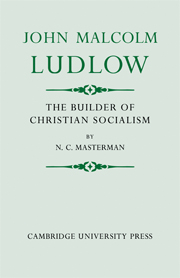Book contents
- Frontmatter
- Contents
- Acknowledgements
- INTRODUCTION
- I THE PARISIAN SCHOOLBOY
- II THE STRANGE YOUNG LAWYER
- III THE FRATERNAL CHRISTIAN
- IV FRENCH SOCIALISM FOR ENGLISH CHARTISTS
- V THE STATESMAN OF CO-OPERATION
- VI THE PRODUCER'S THEORETICIAN
- VII A PROPHET OUT-PROPHESIED?
- VIII REVIEWER AND EDUCATIONALIST
- IX THE DEMOCRATIC IMPERIALIST
- X THE MENTOR OF GERMANS
- XI LEGISLATOR AND CIVIL SERVANT
- XII THE CRITICAL UNIONIST
- Conclusion: LUDLOW'S ACHIEVEMENT
- Appendix: LUDLOW ON THE JUNTA
- Notes
- Bibliography
- Index
VI - THE PRODUCER'S THEORETICIAN
Published online by Cambridge University Press: 07 October 2011
- Frontmatter
- Contents
- Acknowledgements
- INTRODUCTION
- I THE PARISIAN SCHOOLBOY
- II THE STRANGE YOUNG LAWYER
- III THE FRATERNAL CHRISTIAN
- IV FRENCH SOCIALISM FOR ENGLISH CHARTISTS
- V THE STATESMAN OF CO-OPERATION
- VI THE PRODUCER'S THEORETICIAN
- VII A PROPHET OUT-PROPHESIED?
- VIII REVIEWER AND EDUCATIONALIST
- IX THE DEMOCRATIC IMPERIALIST
- X THE MENTOR OF GERMANS
- XI LEGISLATOR AND CIVIL SERVANT
- XII THE CRITICAL UNIONIST
- Conclusion: LUDLOW'S ACHIEVEMENT
- Appendix: LUDLOW ON THE JUNTA
- Notes
- Bibliography
- Index
Summary
The difficulty of finding a group of honest working men and persuading them to combine together, the impossibility of persuading the band of brothers to acquire the point of view and take on the functions which he required of them, instead of making him yield, challenged Ludlow to push his ideas to their logical conclusion. Both in his Christianity, which developed an increasingly objective and Catholic character, and in his Socialism, where he insisted more and more on the necessity of planning, he evolved notions which, even if they seem today rather bizarre, did in fact look forward to a later age.
The rejection of his plans was largely the result of the intervention of Vansittart Neale who, though equally intellectual, was the very reverse of Ludlow. Neale supplied the band of brothers with an alternative programme and with the means of carrying it out. Ludlow seems to have seen from the first in this older and wealthier man a potential rival, while those who were dubious about his policy welcomed Neale as an ally, though he was not in fact a practising Christian. Maurice, especially, was enthusiastic about him. He not only immediately assented to Neale's inclusion in the society, but, having been given by Ludlow and Sulley's constitution the right to choose his own council, appointed him to it, though Neale's theology, Ludlow complained, was ‘Vague and lax’ and he refused to attend the Bible evenings. Neale thus could not in any sense, Ludlow considered, be termed ‘a Mauricean’.
- Type
- Chapter
- Information
- John Malcolm LudlowThe Builder of Christian Socialism, pp. 114 - 135Publisher: Cambridge University PressPrint publication year: 1963



